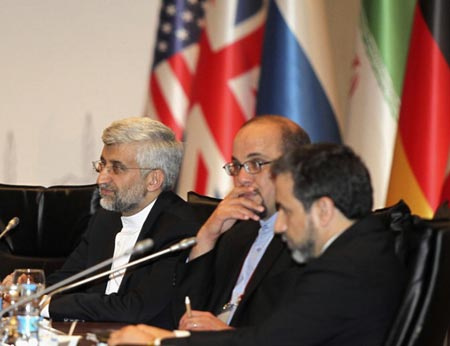Iran's Optimism Was Taken Advantage Of

However, the other reality is that the three-year suspension of talks has caused the majority to request the continuation of negotiations, and this has led negotiations to take the form of what we saw in Istanbul, even if it is only on the surface and in its current form.
This is why I believe that such a challenging atmosphere in negotiations is nothing unusual. The two sides have been negotiating with mistrust for at least ten years and extremist factions have gained influence on these talks during this time. One example can be IAEA reports, which were ambiguous and two-sided while El-Baradei was the Director General, and which have completely changed into political reports against Iran ever since Amano has become the head of the agency.
I believe that, in current circumstances, the P5+1 is looking to obtain its required advantages from Iran, and if this is not achieved, they will blame the failure of negotiations on Iran and prepare the grounds for a new sanctions resolution against our country.
Therefore, the Islamic Republic of Iran needs to have a practical strategy in the current circumstances. A practical strategy is one that can be convincing, at least in the arena of general diplomacy.
The other issue that is important in the Moscow talks is that the Russians will surely feel humiliated. What this means is that if the Moscow talks do not reach the required practical outcome, the Russians will be humiliated. This is an issue that has raised sensitivity in Russia over the outcome of negotiations, and it might give them a more active role in the talks, in the framework of previous Russian proposals.
I therefore believe that, in any circumstance, we must accept the fact that the punitive and sanction-based aspects of the P5+1's behavior are stronger than its constructive aspects. These players feel that if they recognize Iran's rights in the framework of the IAEA Charter in the current situation, it will be regarded as a victory for Iran.
On the other hand, Iran does not want to have to carry the burden of the victory of some of these players either, such as the US, which seeks the reelection of Obama in their presidential elections.
I believe that even in these conditions, it is unclear what result the postponement of the Moscow talks will have. In my opinion, if both sides had agreed to have a series of negotiations on consecutive days instead of the current form of separated talks, there would be a better chance of reaching an agreement. This is because the gap between the talks in Istanbul and in Baghdad, and then until the Moscow talks, has created a vital opportunity for lobbyists, such as Zionist lobbyists and others who will benefit from the failure of negotiations.
In my opinion, the optimistic positions taken in Iran after the Istanbul talks in fact had a reverse effect in the West, even though they were out of goodwill. This is because the more extremist members of the P5+1 felt that Iran needed the positive outcome of negotiations, and this led to the dry and practically useless expression of hope by Ashton and others. Therefore, I believe that they took advantage of Iran's optimism.
I believe that the experience of Iran's relations with Western countries can prove that, as long as there are no practical steps made by the West, we should not be optimistic about any negotiations with them or any diplomatic results.
The existing reality is that disputes over the nuclear dossier are actually disputes between Iran and the US, and not between Iran and the international community. This issue is a result of strategy disputes between Iran and the US. But I believe that neither Iran nor the US has any specific strategy to sit down and negotiate.
But if they do agree on a strategy to resolve the dispute and seriously negotiate, it can be considered as a positive step. However, such a strategy certainly does not exist for the time being and what currently governs Iran-US relations is a form of cold war.
I believe that many regional and extra-regional players regard the dispute between Iran and the US as a vital opportunity for themselves, and it is these players that benefit the most from the Iran-US dispute. Meanwhile, Iran and the US themselves have not yet reached the conclusion that they need to find a practical strategy to resolve their disputes.

